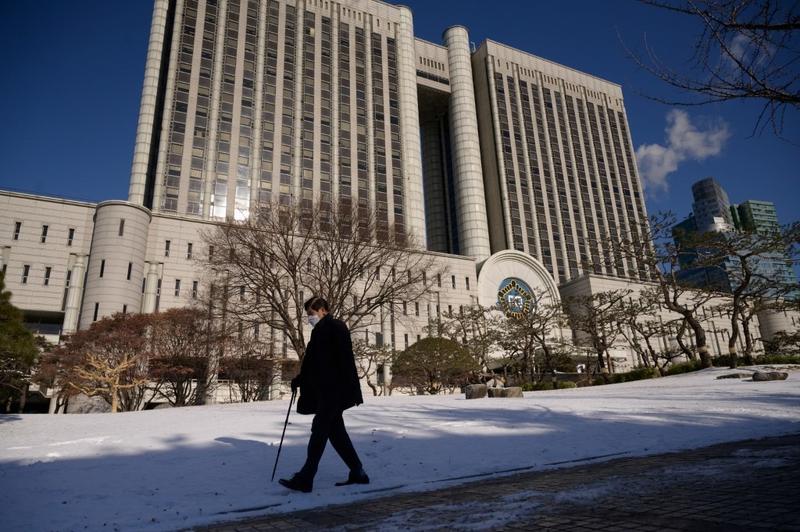 This photo shows a general view of the Seoul Central District Court in Seoul, South Korea, on Jan 8, 2021. (ED JONES / AFP)
This photo shows a general view of the Seoul Central District Court in Seoul, South Korea, on Jan 8, 2021. (ED JONES / AFP)
SEOUL - A South Korean court on Friday ordered Japan's government to pay damages to South Korean victims who were forced into sex slavery for the Imperial Japan's military brothels during World War II.
The Seoul Central District Court ruled that Japan should pay reparations of 100 million won (US$91,200) to each of the 12 plaintiffs, who filed a petition for dispute settlement with the court in August 2013.
It marked the first time that a South Korean court handed down a verdict to order Japan to compensate the victims, who are euphemistically called "comfort women".
It was a crime against humanity that was systematically, deliberately and extensively committed by Japan in breach of international norms.
Justice Kim Jeong-gon, South Korea
ALSO READ: South Korean court begins trial over Japan's sexual slavery
Japan’s Chief Cabinet Secretary Katsunobu Kato called the verdict “unacceptable,” urging Seoul to make an “appropriate response”. Tokyo’s foreign ministry summoned South Korean Ambassador to Japan Nam Gwan-pyo to lodge a complaint.
Ambassador Nam said that he would strive to prevent the ruling from having an “undesirable impact” on ties.
“I emphasized that it was most important for both sides to respond in a calm, restrained manner in order to resolve the issue,” Nam told reporters after being called in.
South Korea’s foreign ministry said it respects the court ruling, though it acknowledges the 2015 pact was a formal agreement. It will also make efforts to ensure the two countries will continue constructive cooperation as it reviews the impact of the ruling on diplomatic relations, the ministry said in a statement.
“It was a crime against humanity that was systematically, deliberately and extensively committed by Japan in breach of international norms,” Justice Kim Jeong-gon said in the ruling.
“Even if it was a country’s sovereign act, state immunity cannot be applied as it was committed against our citizens on the Korean peninsula that was illegally occupied by Japan.”
The damages claim suit was only referred to the Seoul court in January 2016, and the first hearing was held in April last year as the Japanese government declined to officially receive the civil case petition.
READ MORE: S. Korea court rejects attempt to repeal Japan sex slave deal
Only 16 registered Korean survivors are still alive, and six of the 12 victims have died since they initiated the lawsuit.
The court said in its ruling that the plaintiffs suffered from extreme, unimaginable mental and physical pain and were not even compensated for their suffering, noting that illegal acts by the accused can be acknowledged through evidence, relevant materials and testimonies.
The court noted in its verdict that it would be reasonable to value the damages amount at over 100 million won.
The women’s lawyer, Kim Kang-won, said he was “deeply moved” as the ruling acknowledged the Japanese government was accountable for the atrocity.
Kim Dae-wol at the House of Sharing, a shelter for the women, said two of five plaintiffs who live there were healthy enough to remotely monitor the trial and they welcomed the ruling.
READ MORE: Moon to focus on victims in 'comfort women' dispute with Japan
 South Korean Ambassador to Japan Nam Gwan-pyo (center) is surrounded by journalists at the Foreign Ministry in Tokyo, Japan, on Jan 8, 2021. (YUKI SATO / KYODO NEWS VIA AP)
South Korean Ambassador to Japan Nam Gwan-pyo (center) is surrounded by journalists at the Foreign Ministry in Tokyo, Japan, on Jan 8, 2021. (YUKI SATO / KYODO NEWS VIA AP)
Historians say hundreds of thousands of Asian women, mostly from the Korean Peninsula, were kidnapped, coerced or duped into sexual servitude for Japanese troops before and during the Pacific War.
The court noted that the damages suit cannot also be applied to the Seoul-Tokyo deals in 1965 and 2015.
Japan claimed that the 1965 treaty, which normalized diplomatic ties between Seoul and Tokyo, resolved all colonial-era issues, including the wartime sex enslavement and forced labor, but South Korea said the individual right to damages had yet to be resolved. The Korean Peninsula was colonized by Japan from 1910 to 1945.
In December 2015, the then South Korean government reached a final, irreversible agreement with Japan to settle the wartime sex slave issue in return for Tokyo's offer of 1 billion yen (US$9.6 million), and a foundation was built to assist the South Korean victims and their families.
The foundation was formally dissolved in July 2019 as the victims protested against the foundation, demanding the Japanese government's sincere apology and its acknowledgment of legal responsibility for the wartime atrocities.
The Seoul court's ruling is forecast to worsen South Korea-Japan relations, which were already frayed over the wartime forced labor and trade disputes between the two countries.
Despite the expected diplomatic friction, South Korea hurried to resolve the colonial-era issues because of the aged victims.


